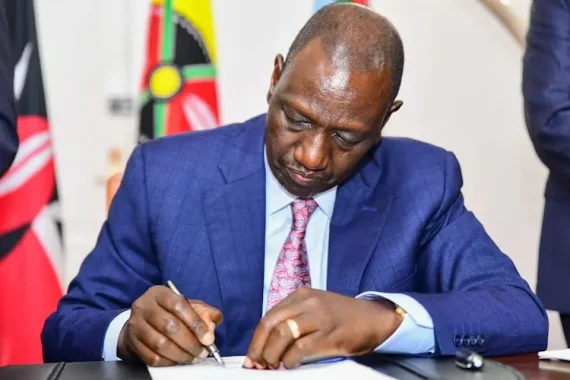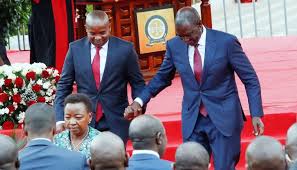President William Ruto has officially signed the 2025 Finance Bill into law, setting into motion Kenya’s KSh 4.2 trillion budget for the 2025/26 financial year. The signing took place at State House, Nairobi, on Thursday morning, just days after Parliament passed the bill following intense public scrutiny and debate.
Ruto’s assent comes after lawmakers scrapped several contentious tax clauses, including the proposal to grant the Kenya Revenue Authority unrestricted access to personal bank accounts. This move followed widespread criticism from civil society, business leaders, and ordinary citizens who viewed the clause as a violation of privacy rights.
Speaking during the signing ceremony, President Ruto emphasized the importance of public engagement. “We have listened to Kenyans, and this law reflects a delicate balance between revenue generation and citizen well-being,” he said. He described the bill as a tool for fiscal sustainability, business growth, and a fairer tax regime.
The new Finance Act aims to raise an additional KSh 30 billion primarily through improved tax compliance and a broader tax base, rather than through new levies. In line with this objective, the government has maintained the current Pay-As-You-Earn (PAYE) bands and excluded several essential commodities from taxation.
Notably, lawmakers zero-rated bread, sanitary pads, and infant formula to cushion households from the high cost of living. This approach contrasts sharply with the 2024 Finance Bill, which triggered deadly protests across the country and was ultimately withdrawn.
Alongside the Finance Bill, Ruto also signed the Appropriation Bill into law. This legislation permits the National Treasury to spend KSh 1.88 trillion from the Consolidated Fund and allows state agencies to utilize KSh 672 billion in internally generated revenue.
Treasury Cabinet Secretary John Mbadi praised the law, stating that it closes loopholes and streamlines tax administration. He also highlighted new provisions such as extending mortgage relief to homes built through SACCOs or personal financing. “This bill removes complexities that hinder compliance and encourages investment in manufacturing, agriculture, and technology,” Mbadi explained.
International observers, including the IMF and World Bank, are also closely monitoring Kenya’s fiscal direction. The Finance Act will play a crucial role in shaping economic recovery, investor confidence, and inflation control in the months ahead.
Looking forward, President Ruto is expected to prioritize the implementation phase. With several other key bills pending, including the Anti-Money Laundering Bill, his administration will be under pressure to demonstrate transparency and accountability.
The Finance Act 2025, thus, marks not just a legal milestone but a test of political leadership and economic management.







casino mit paypal einzahlung
References:
https://skillproper.com/employer/online-sic-bo-bonus-code-uk/
casino mit paypal einzahlung
References:
vieclam.kr
Central urban nest with pool gym pool free parking The Crown Metropol is
a first-class luxury hotel providing panoramic views of
the city. Featuring opulent suites, private infinity pools, high-end furnishings, and panoramic views
of the Swan River or city skyline, it’s the top choice for
celebrities and VIPs.
With stunning 180 degree views of the city skyline,
the Pearl Room has a quality of light and outward focus that is unrivalled anywhere in the world.
With an entertainment calendar packed with 24/7 sport, live music and the thrill of the casino, Crown Perth is the city’s
must-visit destination. Kick back in the funky
outdoor beer garden at The Merrywell pub, or sip on cocktails overlooking the Perth city skyline at the breathtaking new
TWR bar. In 2021, a royal commission in Western Australia found Crown Perth unfit to hold a casino licence,
citing failures in governance, risk management, and anti-money laundering controls.
References:
https://blackcoin.co/welcome-to-crown-hotels-your-ultimate-casino-experience/
Tachi Palace has all the amenities that you would
expect at the best California casino four-star resort.
Tachi Palace has a variety of dining options
available conveniently within the Casino and hotel.
At Tachi Palace, we welcome all our guests to enjoy a world of high-energy gaming action across our two distinct casino areas — the Casino
of the Moon As a Luxury hotel near Fresno and a premier Spa resort California travelers love, Tachi Palace puts everything you need in one place.
While these were certainly better than nothing, players always had to worry about whether the sites they were playing
with could be […] That is, it is based on the traditional Italian game
of Scopa which is still played even today. Since 2009 Kevin has been writing for casino sites for various big names in the industry and CasinoSites.us is but one
of his latest passion projects.
References:
https://blackcoin.co/paypal-casinos-top-online-casinos-for-paypal-deposits-and-withdrawals/
Alle diese Schritte sollen dafür sorgen, dass Sie sich
beim Spielen unserer riesigen Auswahl an Spielen sicher und wohl fühlen.
Wir ermutigen die Teilnehmer, diese Funktionen zu nutzen, die geändert werden können, um sich sicherer zu machen. Jedem Arbeiter wird beigebracht,
riskantes Verhalten zu erkennen und bei Bedarf leise einzugreifen.
Unser Engagement für reibungslose Auszahlungen und aufmerksamen Support stellt sicher, dass jeder Moment angenehm ist, also warum
warten? Mit einer umfangreichen Bibliothek von über 400 Slots von führenden Anbietern können Sie
Ihre Lieblingsspiele genießen oder neue mit Vertrauen erkunden. Die deutsche Lizenz stellt sicher, dass AdmiralBet strengen Vorschriften folgt, die den Spielerschutz und verantwortungsbewusstes
Spielen garantieren. Das bedeutet, dass die Spieler der Plattform vertrauen können, faire und sichere Spielerlebnisse zu bieten.
Mit einer Mindesteinzahlungsanforderung von 10 Euro ist es einfach,
loszulegen und alles zu erleben, was AdmiralBet zu bieten hat.
Um mit AdmiralBet zu beginnen, registrieren Sie sich einfach
auf deren Website, indem Sie die erforderlichen Informationen ausfüllen,
die Ihre persönlichen Daten und Kontaktdaten umfassen.
Elektronisches Roulette und automatisierte Varianten bewegen sich schnell, aber Live-Dealer-Spiele
ermöglichen es Ihnen, bequem von zu Hause aus zu spielen. Sie können viele verschiedene Arten von Blackjack, Roulette, Baccarat und Poker spielen und
die Grafiken und Soundeffekte sind realistisch.
Die Leute spielen immer noch gerne Spiele wie Lucky Lady’s Charm™,
Reel King™ und Eye of Horus auf der Admiral-Plattform.
Im Admiral Casino Online sind Spielautomaten die Hauptattraktion, die die Spieler immer
wieder zurückkommen lässt, egal ob sie
neu im Spiel sind oder schon lange spielen. Progressive Jackpots bieten lebensverändernde Gewinne in €, während Bonusrunden und Freispiele die Spannung aufrechterhalten.
References:
https://online-spielhallen.de/vulkan-vegas-deutschland-test-angebote/
ej1aiq
ns96vb